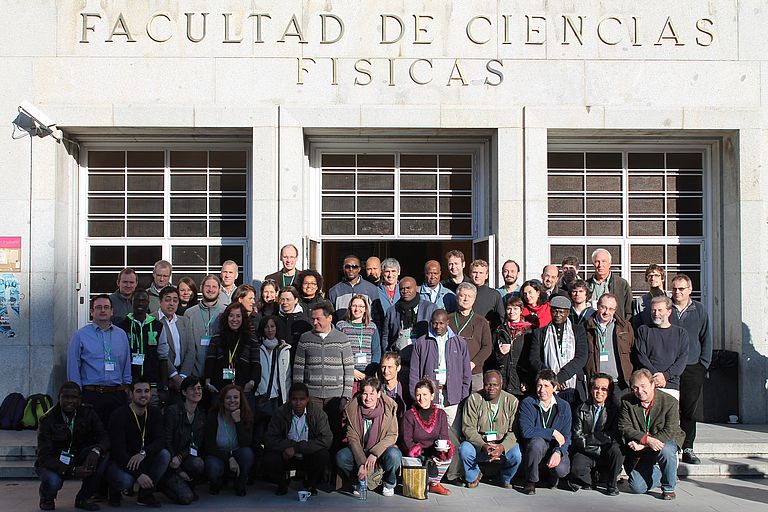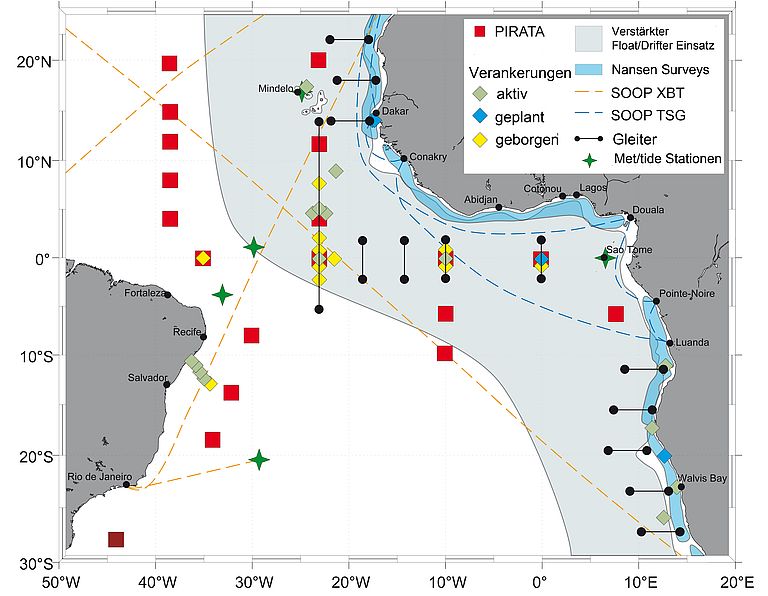What’s Happening to the Tropical Atlantic?
GEOMAR researchers involved in new EU project PREFACE
Rain or no rain in Kiel usually only decides whether or not you put on your foul weather gear. The situation is different in regions such as West Africa, where the rainfall has a significant impact on agriculture, water resources, the spread of diseases and, accordingly, on the well-being of the population. The rain, or more generally, the climate in West Africa, is in turn influenced by the surface temperature of the tropical Atlantic. Such far-reaching interactions between ocean and atmosphere are no longer a secret. "But modern climate models, which are also used to predict precipitation, have problems in this region. The eastern tropical Atlantic is typically too warm in the models, and the cause remains unclear. This makes predictions so difficult for this sensitive region,” says Prof. Dr. Peter Brandt from GEOMAR Helmholtz Centre for Ocean Research Kiel. Together with Prof. Dr. Noel Keenlyside of the University of Bergen, the Kiel oceanographer coordinates the new EU research project PREFACE which aims to significantly improve the forecasts for West Africa over the next four years. During the past week, the scientists involved met for the kickoff workshop in Madrid. In total, scientists from 18 European and 10 African institutes and universities collaborate in the EU project PREFACE.
PREFACE - which stands for "Enhancing Prediction of Tropical Atlantic Climate and its Impact" - is funded through the 7th Framework Programme of the European Union. The objectives of PREFACE include a better understanding of the climate in the area of the tropical Atlantic and a more precise quantification of the impact of climate change on the region. In addition, the interaction of climate change and fishing in marine ecosystems is part of the investigation. The project runs until the end of October 2017. Then the scientists plan on delivering improved simulations and predictions on the subject.
"For 2014, 2015 and 2016, ship expeditions are planned in the eastern tropical South Atlantic," says Prof. Brandt. These trips also include the deployment of oceanographic moorings, that measure currents, salinity and temperature of the water. An essential part of the measurement campaigns is the use of autonomous probes, so-called gliders. For weeks or even months, they independently measure the top 1000 meters of the water column and send their data to the scientists regularly via satellite transmission. "Such measurements are essential for the understanding of climate variability in the tropical Atlantic, and the great interest of our various African partner institutions highlights the increased awareness of the importance of climate change on natural resources in these countries," explains Professor Brandt. He has long been concerned with the effects of ocean currents on weather and climate in Africa.
In addition to the observational data which oceanographers gather, simulations with coupled ocean-atmosphere models are also performed at GEOMAR in the context of PREFACE. "The spatially limited observations alone make it difficult to understand mechanisms and to explore causes of climate variability," says Prof. Dr. Mojib Latif, director of the Research Center "Ocean Circulation and Climate Dynamics" at GEOMAR. "Here we need the help of model experiments. The more accurately we know the current events in the tropical Atlantic, the better our models will be in predicting future developments," says Prof. Latif.
Photos in higher resolution:
GEOMAR has been researching the tropical Atlantic for quite some time: In 2011, RV METEOR was there to deploy some gliders. Photo: H.V. Neuhoff
Scientists from 28 different research institutes met in early December for the PREFACE kickoff workshop in Madrid. Photo: PREFACE
For the measurements in the tropical Atlantic, the scientists of the PREFACE project will use, among others, existing measurement networks of the international research programs PIRATA and TACE between West Africa and South America. Graphics: TACE/GEOMAR
Contact:
Jan Steffen (GEOMAR, Kommunikation & Medien), Tel.: 0431 600-2811, jsteffen(at)geomar.de
![[Translate to English:] Im tropischen Atlantik forscht das GEOMAR schon länger: Auch 2011 waren das FS METEOR und einige Gleiter dort im Einsatz. Foto: H.v. Neuhoff, GEOMAR GEOMAR has been researching the tropical Atlantic for quite some time: In 2011, RV METEOR was there to deploy some gliders. Photo: H.V. Neuhoff](/fileadmin/_processed_/0/4/csm_2011-11-18_METEORundGleiter_HvNeuhoff_b17a4d00eb.jpg)




